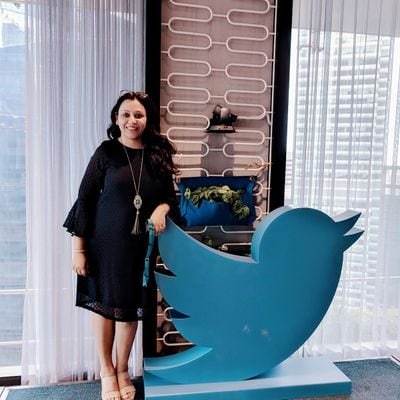From Google's Sapna Chadha to Twitter's Kanika Mittal, women in leadership on ho
Women leaders in business, sales and marketing tell us how they are spearheading change in the industry


In an unfiltered conversation, women leaders in business, sales and marketing shared how they have been spearheading change in the industry and leading the way to craft powerful impact, drive businesses, and cultivate a truly inclusive environment and culture. These women have been leading the way by following their passions and teaching the world how to #OwnIt and #BreakTheBias. On the Twitter Spaces session panel, we had:
Sapna Chadha, vice president-marketing, India & South East Asia, Google
Apurva Purohit, author and co-founder, Aazol
Anuranjita Kumar, author, founder & CEO, We-ACE
and Kanika Mittal, lead, Large Client Solutions, Twitter India.
The session was hosted and moderated by Storyboard18’s editor Delshad Irani. Read on to find out how these women #OwnIt and #BreakTheBias in life and at work.
Edited excerpts.
Q. As women, how difficult do you think is it to find a calling that"s our own that is not in any way superimposed by society or in the moulds that society has made for us? How difficult or easy is it in the space of business and marketing?
Sapna Chadha: Growing up, I watched my mother as a woman in technology in the 70s, a space widely dominated by men. So I didn’t think it was hard to find your own calling and space.
That was until I moved to India from the US, and had children. My belief started shaking, as I felt the society’s expectations of me superimposed on my career ambitions. That’s when I realised that perhaps I was a real minority. I almost dropped out of the career, while on the road to becoming a Chief Marketing Officer. It took several allies and sponsors—a lot of them being male champions of change—encouraging me to not quit, for me to decide on staying.
Society does superimpose expectations on women, creating doubts that wander like gremlins in our own heads. But we are capable of overcoming those doubts. Today, I firmly believe that women can do what they want, and I will tell my daughter the same and not worry about what society says.
Anuranjita Kumar: I"m still searching for my calling. Even though I had both working parents, they were doctors and expected me to follow the same path. However, a year into my medical course I realised, it’s not what I wanted to do. I went on to experiment with psychology and then HR. In the past 25-26 years, I have found my milestones changing, based on the stage I was at in my life.
There has always been background noise and influences.
 Anuranjita Kumar, author, founder & CEO, We-ACE
Anuranjita Kumar, author, founder & CEO, We-ACE
There’s pressure to get married, then have kids and so on. It can get confusing. I was very lucky to have a brilliant partner and a supportive ecosystem throughout my career.
After working for almost two and a half decades, I decided to create more impact and become an entrepreneur. I do feel that in the last two years I may have found a calling. It gets tough when you enter this late in the market as a woman entrepreneur.
People ask why I want to start over at this stage. The question is how much conviction you have for what you really want to do and how you stay the course, then you brace for any challenges on the way.
Q. Apurva, you"ve led organisations and have had an illustrious career. Has your calling changed a few times?
Apurva Purohit: It"s very clear that for women to find their space, where they can be themselves, is not easy. Today, there is so much more discussion on diversity, reservations, flexible timings and back to work initiatives for women.
However, the socialising that women have gone through, pulls them back constantly. They are told their primary role is as nurturers and not wage earners.
According to research released around Women’s Day, the majority of participants, out of a large sample, agreed that men and women have equal rights today, in 2022. But the same majority believed that in the case of scarcity of jobs, men had more rights over the jobs compared to women.
 Apurva Purohit, author and co-founder, Aazol
Apurva Purohit, author and co-founder, Aazol
That really summarises the reality today. A woman’s career is seen as something she does for herself, while a man"s career is something that he does for the family. This perception has led to a headwind against women trying to find their space.
We need to prioritise ourselves and realise that our career is as important as our family and husband. That must be followed by creating a supportive ecosystem around you and then battling your intrusive thoughts. It’s career and family, not career or family.
Kanika Mittal: My career trajectory up to Twitter was also very different. I was the CMO at Reebok, and I left that job at the peak of my career. I was deeply passionate and fond of marketing, it was my calling at that time. But then I moved to sales. I joined Twitter.
It did take a lot of determination. A lot of effort and a lot of resilience to shine in the role. Therefore it all boils down to what you’re truly feeling passionate about at that moment. How much are you willing to commit, learn, relearn, and start over?
We are so much better equipped today in terms of policies around diversity and inclusion. There are flexibilities for commuting or hybrid working. With all of this enablement and the right mindset, you can pursue your calling in life. No matter how many times it changes.
Q. What are your thoughts on mentorship and how women can support each other to navigate through all these challenges, especially in traditionally male-dominated industries? If you could give a few examples of how mentorship and guidance helped you and how you were in turn able to make an impact on other women"s lives, giving them wings to fly.
Kanika Mittal: I personally believe mentorship is key to success. Especially women mentoring women is much needed because only women can understand each other"s challenges.
Sarah Personette, who leads Global Customer Solutions on Twitter, inspires me. She spoke about imposter syndrome, about moments in our careers where we doubt ourselves and don"t feel confident enough. Women often have this innate ability to critique and not appreciate themselves the way male counterparts might do for themselves. This is deeply prevalent. She said that it might just be a good thing. Not being over-confident makes you a better leader. It makes you a nurturer and helps you do your job with more empathy.
 Kanika Mittal, lead, Large Client Solutions, Twitter India
Kanika Mittal, lead, Large Client Solutions, Twitter India
I used to run a programme called "Streak", which also means a group of tigers. I believe that when women return to work after their maternity break, they are figuratively like a group of tigers wanting to roll back with all the energy possible. But they"re also pulled back since it’s hard to physically be on their A-game after a six-month break .
"Streak" supports and mentors these tigresses for 6-12 months post their leaves, helping them keep up with their career trajectory to become the best version of themselves.
Q. Anuranjita, having worked in extremely competitive environments where everything is high and running, is there a pattern observed in women’s behaviour in such environments versus their male counterparts? Are they more organised or composed when dealing with high-pressure situations? What are some of the areas where we could do better?
Anuranjita Kumar: When I was doing my first fundraiser as a novice entrepreneur—I"d never been on the client-end—my first pitch was so bad that I wouldn"t give myself money. Over time I learned how to pull pitches together and manage investors. When we did the final pitch to our lead investor, I thought I had done a brilliant job with a 45-minute slideshow. But he looked at me and said he didn’t get how we will make money out of this. My heart sank and I thought we had lost the investor. But we started again and spoke to him in his own language. The deal was done in 15 minutes. I genuinely believe men and women’s experience in high-pressure environments depends on how used to you are to dealing with it.
A bit of advice I would like to give is to balance your emotions to be clear of your purpose, so when situations get tricky, our confidence doesn’t waver.
Staying objective is necessary, you can be passionate about work while maintaining a distance. I don’t think that women are more emotional than men. I think sometimes low self-esteem emanates from nervousness.
Q. What would you say is the current state of how we"re looking at women as business leaders? How are women still struggling with imposter syndrome and dealing with the hit at our confidence now and then?
Apurva Purohit: The world is validating and supporting the requirement for more women leaders. All data and research on the ways of working post the pandemic recognise women as more empathetic, nurturing and collaborative. Far better in managing the changing world.
Unfortunately, while the world is patting us on the back and asking for more women leaders based on a country’s GDP or an organisations’ profitability, I"m not sure whether we believe this narrative ourselves. That"s the constant messaging I give to all women. A critic is sitting inside of us, that imposter, who"s telling us "we"re not good enough". That’s because of how we"ve been brought up.
That inner-critic needs to change into a cheerleader. It starts with us cheering for ourselves. The next thing to do would be to raise our daughters differently from how it has always been. Going back to the point of mentorship, I"ve seen the power of women supporting other women.
Many times, in their desire to take care of women, organisations end up doing something I call the patriarchal bias, where they don’t give women tough roles or assignments. “She has a family to take care of. How can I expect her to travel? She has small children at home. This job entails working with a very tough client."
When we don’t give women these tough jobs in the view of taking care of them, we are hampering their growth.
I"ve always believed in my own set of organisations, that except for those two-three years where women have had children and they need that special support, we have to treat them exactly in the same manner as our male executive colleagues. Only then will they grow and succeed.
Q. Sapna, since you mentioned your personal experience of motherhood and coming back to work, any thoughts on what Apurva just said?
Sapna Chadha: We sometimes underestimate how much of the issue of the gender gap is caused by ourselves. Out of women holding themselves back and men holding them back from their careers, I see more women being their own saboteurs. It is on all of us in the system to push women in better directions. Women often don’t apply for jobs unless they have 100 percent of the qualification, that’s not really common among men. This is where we need to make information a power.
 Sapna Chadha, vice president-marketing, India & South East Asia, Google
Sapna Chadha, vice president-marketing, India & South East Asia, Google
We recently launched a campaign called ‘Search for Change,’ which we came up with because we saw the questions that women were asking themselves on Google. They"re asking about equal pay, what discrimination looks like, and what they can do about it? How to get access to loans or financial support?
Women are asking questions they didn’t before, they were scared to use their voice in our world. So they would keep the questions to themselves. Ultimately education and information are going to be propellors for women and hopefully give them the confidence that they need to move forward and use their voices more.
Q. How do you think young women should go about matching their interests with opportunities that are available to them? Especially if you look at a space like sales and marketing, which is so rich and thriving with opportunities. So how should young women steer through the clutter and opportunity gaps and find where to plant one’s roots?
Kanika Mittal: My 3P framework:
Passion: Find what you"re really passionate about.
Purpose: Once you start pursuing your passion, think about what is the purpose of it. It’s easy to fall into a rut in our day-to-day lives and our job. Finding a purpose that really excites our soul can turn your passion into something that gives your work meaning.
Persistence: Don"t give up. Be persistent. Life is never going to be easy for working women. We are wearing multiple hats all the time. So if you really want to succeed, the crux of it is to be persistent and not give up.
Q. In your experience of working with younger women as well as women rethinking their priorities and what they want to do. What is your advice to them?
Anuranjita Kumar: Mentoring and talking to people with more experience in your industry works. We have about 200,000 women on the We-Ace platform, they often ask us questions. We help them by:
1. Helping them identify what they want when they tell us they wish to change career paths.
2. Connect to people who have experienced the pros and cons of such a situation.
3. Skill enhancements at this time are important to consider trends in technology driving an industry before moving into it.
Q. What are your thoughts on opportunities and women finding where to plant their roots?
Apurva Purohit:
1. Sometimes, women want to have it all at the same time. Of course, they will get it, but in a 30- or 40-year career, not in the first five years. Thus it’s important to prioritise your goals and draw milestones for yourself. So that you can stay focused and follow through with life more easily.
2. Many women look at their weaknesses instead of their strengths, and I see that happening repeatedly. Focus on your strengths, build them up further, and don"t agitate over your weaknesses.
3. I think women need to focus and find their purpose to be able to co-opt their families into their careers. Families often don"t even know what women do at work. I"ve been hoping that the last two years of working from home have showcased to our families how important our jobs are and how fulfilled we feel doing so.
Sapna Chadha:
1. Share your love for work and your accomplishments with your family. We might think that at home, my kids and family should be a priority. But once you start sharing your work life with your families, you may get respect from them and even emotional support as they start to understand your work.
2. I always tell women I work with that careers are like jungle gyms, not ladders. They aren’t a straight path. You have to stretch, navigate and move around, and take risks to reach success. Moving around and taking risks helped me have a bird’s eye view of new opportunities.
3. With all the advancements we are seeing with technology being used in marketing, I see more women holding themselves back because they think it"s hard. But nothing is as hard as we think once we get into it.
Q. What is the best advice that you received in your career?
First Published: Apr 13, 2022, 13:42
Subscribe Now